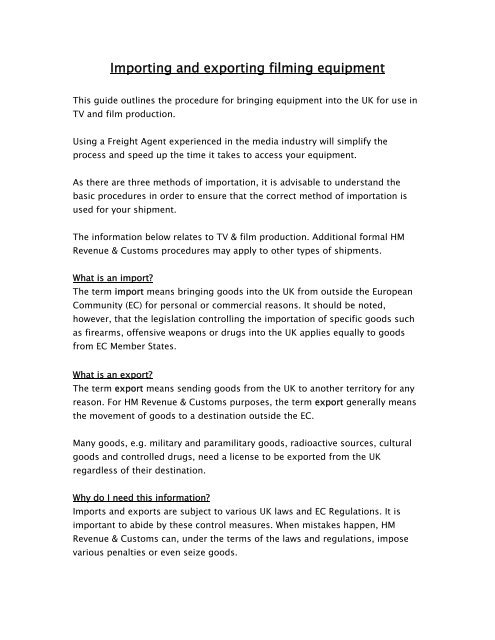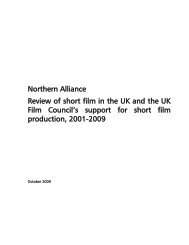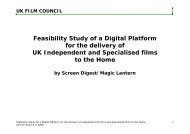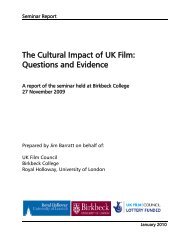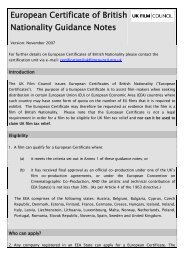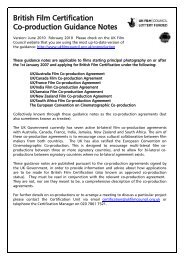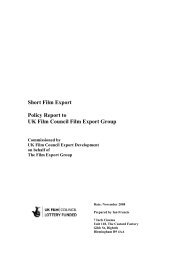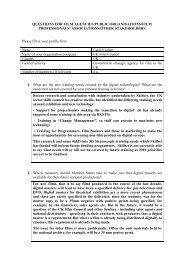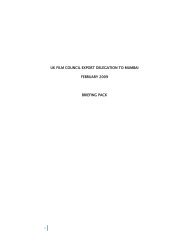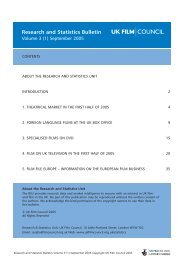A Guide to Importing and exporting Filming equipment into the ... - BFI
A Guide to Importing and exporting Filming equipment into the ... - BFI
A Guide to Importing and exporting Filming equipment into the ... - BFI
You also want an ePaper? Increase the reach of your titles
YUMPU automatically turns print PDFs into web optimized ePapers that Google loves.
<strong>Importing</strong> <strong>and</strong> <strong>exporting</strong> filming <strong>equipment</strong><br />
This guide outlines <strong>the</strong> procedure for bringing <strong>equipment</strong> in<strong>to</strong> <strong>the</strong> UK for use in<br />
TV <strong>and</strong> film production.<br />
Using a Freight Agent experienced in <strong>the</strong> media industry will simplify <strong>the</strong><br />
process <strong>and</strong> speed up <strong>the</strong> time it takes <strong>to</strong> access your <strong>equipment</strong>.<br />
As <strong>the</strong>re are three methods of importation, it is advisable <strong>to</strong> underst<strong>and</strong> <strong>the</strong><br />
basic procedures in order <strong>to</strong> ensure that <strong>the</strong> correct method of importation is<br />
used for your shipment.<br />
The information below relates <strong>to</strong> TV & film production. Additional formal HM<br />
Revenue & Cus<strong>to</strong>ms procedures may apply <strong>to</strong> o<strong>the</strong>r types of shipments.<br />
What is an import?<br />
The term import means bringing goods in<strong>to</strong> <strong>the</strong> UK from outside <strong>the</strong> European<br />
Community (EC) for personal or commercial reasons. It should be noted,<br />
however, that <strong>the</strong> legislation controlling <strong>the</strong> importation of specific goods such<br />
as firearms, offensive weapons or drugs in<strong>to</strong> <strong>the</strong> UK applies equally <strong>to</strong> goods<br />
from EC Member States.<br />
What is an export?<br />
The term export means sending goods from <strong>the</strong> UK <strong>to</strong> ano<strong>the</strong>r terri<strong>to</strong>ry for any<br />
reason. For HM Revenue & Cus<strong>to</strong>ms purposes, <strong>the</strong> term export generally means<br />
<strong>the</strong> movement of goods <strong>to</strong> a destination outside <strong>the</strong> EC.<br />
Many goods, e.g. military <strong>and</strong> paramilitary goods, radioactive sources, cultural<br />
goods <strong>and</strong> controlled drugs, need a license <strong>to</strong> be exported from <strong>the</strong> UK<br />
regardless of <strong>the</strong>ir destination.<br />
Why do I need this information?<br />
Imports <strong>and</strong> exports are subject <strong>to</strong> various UK laws <strong>and</strong> EC Regulations. It is<br />
important <strong>to</strong> abide by <strong>the</strong>se control measures. When mistakes happen, HM<br />
Revenue & Cus<strong>to</strong>ms can, under <strong>the</strong> terms of <strong>the</strong> laws <strong>and</strong> regulations, impose<br />
various penalties or even seize goods.
Can I use an agent <strong>to</strong> act on my behalf?<br />
It is possible <strong>to</strong> appoint a representative (Freight Agent) <strong>to</strong> act on your behalf.<br />
This will usually be as “a direct representative”. Direct representatives act in <strong>the</strong><br />
name of, <strong>and</strong> on behalf of, ano<strong>the</strong>r person. If you employ an agent <strong>to</strong> act as a<br />
direct representative i.e. <strong>the</strong> agent makes <strong>the</strong> cus<strong>to</strong>ms declaration on your<br />
behalf (as <strong>the</strong> principal) acting in your name, you are deemed <strong>to</strong> be <strong>the</strong><br />
declarant <strong>and</strong> <strong>the</strong>refore liable for any cus<strong>to</strong>ms debt.<br />
What are <strong>the</strong> types of imports that may be relevant <strong>to</strong> my shipments?<br />
There are three main types of imports which are:<br />
1. Import<br />
2. Temporary import<br />
3. <strong>Importing</strong> any goods covered by an ATA Carnet*<br />
1. Import<br />
If <strong>the</strong> shipment will be used in <strong>the</strong> EC <strong>and</strong> will not return <strong>to</strong> its country of origin,<br />
(such as consumables or something that may be destroyed during production),<br />
it is deemed <strong>to</strong> be liable <strong>to</strong> duty <strong>and</strong> VAT. These items require a formal cus<strong>to</strong>ms<br />
import procedure <strong>and</strong> are liable for payment of duties <strong>and</strong> sales tax prior <strong>to</strong><br />
<strong>the</strong>ir release.<br />
2. Temporary import<br />
If <strong>the</strong> items imported are <strong>to</strong> be re-exported back <strong>to</strong> <strong>the</strong>ir country of origin, a<br />
procedure can be used which allows <strong>the</strong> temporary import of <strong>the</strong> shipment. HM<br />
Revenue & Cus<strong>to</strong>ms requires that duty <strong>and</strong> VAT are paid On Deposit prior <strong>to</strong> <strong>the</strong><br />
release of <strong>the</strong> shipment, normally via a Bank Transfer. When <strong>the</strong> items are reexported,<br />
any monies paid <strong>to</strong> HM Revenue & Cus<strong>to</strong>ms are returned, assuming<br />
that <strong>the</strong> shipment being exported is exactly <strong>the</strong> same as <strong>the</strong> import. It may take<br />
up <strong>to</strong> three months for any deposits <strong>to</strong> be refunded.<br />
3. ATA Carnet<br />
*The initials ATA are an acronym of <strong>the</strong> French <strong>and</strong> English words "Admission<br />
Temporaire/Temporary Admission". An ATA Carnet is an international cus<strong>to</strong>ms<br />
document that permits <strong>the</strong> duty free <strong>and</strong> tax free temporary importation of<br />
goods for up <strong>to</strong> one year. Not all countries are part of <strong>the</strong> ATA Carnet scheme,<br />
but your local Freight Agent or Chamber of Commerce can advise.
ATA Carnets cover:<br />
• commercial samples<br />
• professional <strong>equipment</strong><br />
• goods for presentation or use at trade fairs, shows, exhibitions etc.<br />
Items which may be taken across borders duty-free <strong>and</strong> tax-free with <strong>the</strong> use of<br />
an ATA Carnet include: computers, repair <strong>to</strong>ols, pho<strong>to</strong>graphic <strong>and</strong> film<br />
<strong>equipment</strong>, musical instruments, industrial machinery, vehicles, jewellery,<br />
clothing, medical appliances, aircraft, race horses, old masters, prehis<strong>to</strong>ric<br />
relics, ballet costumes <strong>and</strong> music sound systems.<br />
ATA Carnets do not cover:<br />
• perishable or consumable items or goods for processing or repair.<br />
Exports<br />
The same three processes apply <strong>to</strong> shipments leaving <strong>the</strong> EC.<br />
Information prepared for <strong>the</strong> Office of <strong>the</strong> British Film Commissioner by:<br />
Media World Logistics<br />
E: info@MWLUK.COM<br />
T: +44 (0)20 8573 9999


